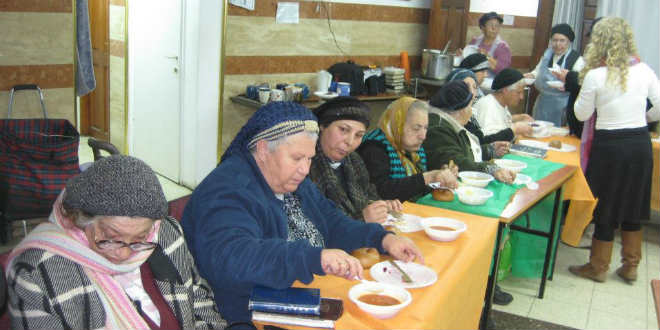“For the poor shall never cease out of the land; therefore I command thee, saying: ‘Thou shalt surely open thy hand unto thy poor and needy brother, in thy land.’” (Deuteronomy 15:11)

The National Insurance Institute and the Central Bureau of Statistics in Israel released an annual report on poverty in the country. The numbers for 2012, while showing some improvement over last year, are still very troubling.
1,754,700 people, including 439,500 families and 817,200 children, were living in poverty in 2012. The year before, 1,838,600 people — 442,000 families and 860,900 children — were in that situation. Poverty is defined as a monthly income of less than NIS 2,820 for individuals and less than NIS 4,513 for couples. A family of five earning less than NIS 8,500 is also considered poor.
Although the number of poor families and children dropped slightly over the year, the number of seniors living in poverty increased. The poverty rate among families dropped from 19.9% to 19.4%, among children it fell 2%, and the overall number of individuals suffering from poverty came down from 24.8% to 23.5%. The rate of poverty among seniors, however, rose 3% since the year before.
Other worrying trends include 5% of families with two workers or more – some 50,700 families – living below the poverty line in 2012, up from 4.6% in 2011 and an overall increase of 2% from 1999. The poverty rate for working families with only one provider was 24.6% in 2012, compared to 25.9% in 2011. Sixty-six percent of families with no providers were living below the poverty line.
These numbers demonstrate a significant rise in the poverty rate since 1999, when working families living below the poverty line represented just 7% of the population. Today, they mark 13.7%.
Poverty rates were much higher among Israel’s Arab population, with 53.4% living in poverty. The Jerusalem district was the worst off, taking into account the percentage of the poor and the severity of their conditions, with 59.4% of children and 34.7% of families living below the line. In contrast, the central region has the lowest rates with 15.9% of children and 9.9% of families living in poverty.
In comparison to other OECD countries, Israel ranks third, behind Mexico and Chile, in poverty rates, though it had been second in the past. In terms of inequality, it ranks behind Chile, Mexico, Turkey and the US as one of the countries with the greatest inequality in the GINI index.
Not all the result released in the report were devastating, however, as they showed 36% of families, including some 128,700 children, escaped from poverty in 2012.
The 2012 report marked a change in how the information used was gathered. In the past, joint household expenditure surveys and income surveys of the workforce were used, whereas for this report, only household expenditure surveys were employed. The number of households surveyed also shrank, from 15,000 to 9,000. According to the authors of the report, this should be taken into account when comparing the results to previous years.
The report was presented to President Shimon Peres on Tuesday morning, by Welfare and Social Services Minister Meir Cohen and NII Director Shlomo Mor Yosef. It included a letter from National Insurance Institute Deputy Director-General for Research and Planning Dr. Daniel Gottlieb, commending several government policies on fighting poverty, including the appointment of a committee to fight poverty, headed by Eli Alalouf. The letter noted, however, that 2013 cuts to child allowances were harmful.
The opposition was unimpressed by government efforts to fight poverty. “Poverty is a strategic threat to the state of Israel,” said opposition leader Isaac Herzog (Labor). The 2012 poverty report presents a “difficult picture, where more and more families with two working parents do not manage to survive.” He blamed Prime Minister Benjamin Netanyahu for a “damaging economic policy along with [past] finance minister Yuval Steinitz… and Finance Minister Yair Lapid today.”
Labour MK Itzik Shmuli said, “Lapid scolds the poor to go and work but the statistics show that not only a majority of the poor are working people, but 25% of poor children go out and work. The government must set social targets in legislation to eradicate poverty and reduce inequality; we have had enough of empty declarations of importance to the government, when all the government does is tell people to go to work.”
Founder and president of the International Fellowship of Christians and Jews Rabbi Yechiel Eckstein, expressed his concerns, as well. “The International Fellowship of Christians and Jews meets poverty every day, in every city, in every sector, at every age. We see too many citizens that are unable to exist respectably.
“Especially hard is the problem among the elderly. The increase in poverty rates among them is a societal and moral red line that we are not allowed to cross.”
“The initiative of Social Welfare Minister Meir Cohen to appoint a committee to fight poverty that we are a part of is an important step; though without full governmental guidance and backing, shaping policy and setting clear targets requiring allocation of adequate funding essential for the war against poverty, it will have no use,” added Eckstein.




